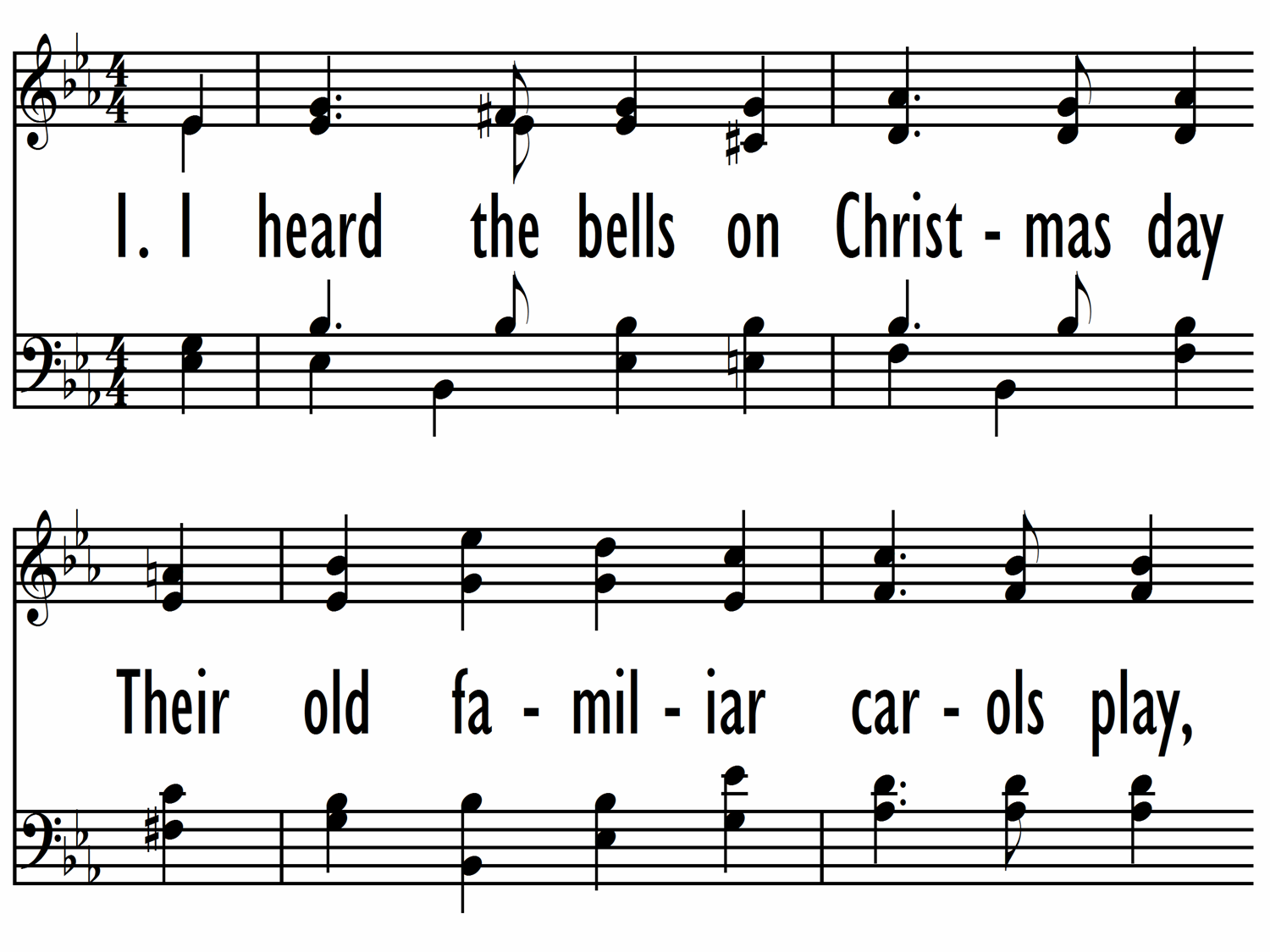- |
User Links
Christmas Bells

I heard the bells on Christmas day
Author: Henry W. Longfellow (1864)Tune: WALTHAM (Calkin)
Songs of Response
Published in 124 hymnals
Printable scores: PDFPlayable presentation: Lyrics only, lyrics + musicAudio files: MIDI, Recording
Representative Text
1 I heard the bells on Christmas day
Their old familiar carols play,
And wild and sweet the words repeat
Of peace of earth, good will to men.
2 I thought how, as the day had come,
The belfries of all Christendom
Had rolled along th'unbroken song
Of peace on earth, good will to men.
3 And in despair I bowed my head:
"There is no peace on earth," I said,
"For hate is strong, and mocks the song
Of peace on earth, good will to men."
4 Then pealed the bells more loud and deep:
"God is not dead, nor doth He sleep;
The wrong shall fail, the right prevail,
With peace on earth, good will to men."
5 Till, ringing, singing on its way,
The world revolved from night to day
A voice, a chime, a chant sublime,
Of peace on earth, good will to men.
Baptist Hymnal, 1991
Author: Henry W. Longfellow
 Longfellow, Henry Wadsworth , D.C.L. was born at Portland, Maine, Feb. 27, 1807, and graduated at Bowdoin College, 1825. After residing in Europe for four years to qualify for the Chair of Modern Languages in that College, he entered upon the duties of the same. In 1835 he removed to Harvard, on his election as Professor of Modern Languages and Belles-Lettres. He retained that Professorship to 1854. His literary reputation is great, and his writings are numerous and well known. His poems, many of which are as household words in all English-speaking countries, display much learning and great poetic power. A few of these poems and portions of others have come into common use as hymns, but a hymn-writer in the strict sense of that term he… Go to person page >
Longfellow, Henry Wadsworth , D.C.L. was born at Portland, Maine, Feb. 27, 1807, and graduated at Bowdoin College, 1825. After residing in Europe for four years to qualify for the Chair of Modern Languages in that College, he entered upon the duties of the same. In 1835 he removed to Harvard, on his election as Professor of Modern Languages and Belles-Lettres. He retained that Professorship to 1854. His literary reputation is great, and his writings are numerous and well known. His poems, many of which are as household words in all English-speaking countries, display much learning and great poetic power. A few of these poems and portions of others have come into common use as hymns, but a hymn-writer in the strict sense of that term he… Go to person page >Text Information
Related Texts
| First Line: | I heard the bells on Christmas day |
| Title: | Christmas Bells |
| Author: | Henry W. Longfellow (1864) |
| Meter: | 8.8.8.8 |
| Place of Origin: | United States |
| Language: | English |
| Copyright: | Public Domain |
| Liturgical Use: | Songs of Response |
Notes
Access an additional article on the Canterbury Dictionary of Hymnology:
For Leaders
Text:
The text for this hymn is based off of Henry Wadsworth Longfellow’s 1863 poem, “Christmas Bells.” The poem itself was inspired by several painful events in Longfellow’s life. For one, his son Charles joined the Union army without telling Henry before he left. Eventually, Charles was severely wounded in battle. Around the same time, Longfellow’s wife, Frances, tragically died from an accidental fire, which left Henry badly burned as well. Longfellow wrote his poem on Christmas Day, telling of the despair in his heart as he heard the Christmas bells play. Fortunately, this poem ends on an encouraging note, emphasizing hope and peace among men, despite the troubles of the world.
Tune:
The tune WALTHAM was written by John Baptiste Calkin in 1872, during his time as the organist at St. Thomas’s Church in Camden Town. WALTHAM was written for Longfellow’s poem, and became Calkin’s best-known work. Although this tune is primarily used in “I Heard the Bells on Christmas Day,” it has been paired with several other texts across the years.
When/Why/How:
As implied by the name, this song should be played in the Christmas season.
Suggested music:
- For the organ:
- For handbells:
Luke Getz Hymnary.org
Timeline
Arrangements
Media
- MIDI file from Baptist Hymnal 1991 #98
- Audio recording from Baptist Hymnal 1991 #98
- MIDI file from Baptist Hymnal 1991 #98
- Audio recording from Baptist Hymnal 2008 #187
- Audio recording from The Celebration Hymnal: songs and hymns for worship #267
- MIDI file from The Cyber Hymnal #2815
- Audio recording from Hymns of Faith #123
- MIDI file from Timeless Truths #928


 My Starred Hymns
My Starred Hymns





